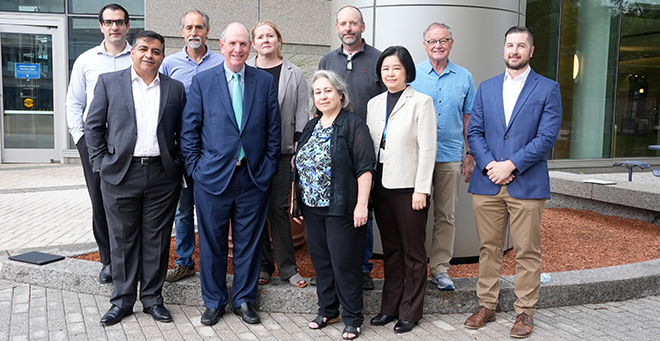
Bridge Innovation and Business Development at UMass Chan Medical School has awarded $2.2 million to seven faculty-led biomedical research projects. The BRIDGE Fund supports critical research milestones that will expedite the advancement of discoveries and technological advances into viable commercial products for diagnosing and treating human diseases.
A dozen project finalists presented to an external advisory board comprised of biomedical industry leaders, investors and venture capitalists last month during a luncheon and networking event at the UMass Club in Boston Awardees were selected by the BRIDGE Innovation & Business Development New Ventures team and the external advisory board based on scientific merit, market opportunity and commercial viability.
“We had an outstanding number of applications this year and 12 amazing presentations,” said Parth Chakrabarti, MBA, executive vice chancellor for innovation and business development. “Listening to our faculty’s cutting-edge research and being able to get feedback from our external advisory board members produced some thought-provoking questions and generated some exciting discussions about how to focus commercialization efforts.”
As part of the new “venture” model of funding adopted by the BRIDGE Fund, project funding will be linked to milestone achievements with clear objectives and detailed criteria for advancement before receiving additional funding and proceeding to successive milestones. Quarterly follow-ups will be conducted to cultivate investor interest for project commercialization.
Established in 2019, the BRIDGE Fund supports the Medical School’s research portfolio through programs that promote entrepreneurship and innovation by leveraging the wide array of expertise and capabilities at UMass Chan. Guided by an external advisory board of industry leaders, the BRIDGE Fund has increased from $1 million in 2019 to $3 million in 2022. Proceeds are invested annually in projects by UMass Chan researchers whose work shows promise for commercialization and translation to clinical application.
“Thanks to our increased budget and the milestone-based restructuring of the funding process, this year we were able to fund seven projects,” said Denise Karaoglu Hanzatian, PhD, executive director of new ventures for BRIDGE. “BRIDGE Funding will support the first aim of each awarded proposal and additional funds will be made available upon the successful achievement of suggested milestones.”
2022 BRIDGE Fund awardees
- Joel Richter, PhD, the Arthur F. Koskinas Chair in Neuroscience and professor of molecular medicine: Restoration of FMRP by ASO-mediated correction of impaired FMR1 RNA splicing as a therapeutic for fragile X syndrome.
- Katherine A. Fitzgerald, PhD, the Worcester Foundation for Biomedical Research Chair III, professor of medicine, vice chair of research in the Department of Medicine and director of the Program in Innate Immunity: Development of inhibitors of ASC-dependent Inflammasomes for the treatment of inflammatory diseases.
- Michael Volkert, PhD, professor of microbiology & physiological systems: Large animal testing of OXR1 gene therapy for retinal degeneration.
- Javed Mannan, MD, MPH, assistant professor of pediatrics: Use of a chest shield during phototherapy to decrease patent ductus arteriosis in premature infants
- Jie Song, PhD, professor of orthopedics & physical rehabilitation: On-demand antimicrobial delivery to combat medical implant-related infections
- Michelle Xiaofang Yang ,MD, PhD, associate professor of pathology: Validation of liquid biopsy as an early noninvasive screening test and new therapeutic targets for gastroesophageal adenocarcinoma
- Paul Thompson, PhD, professor of biochemistry & molecular biotechnology and director of the Chemical Biology Interface program, and Dr. Fitzgerald: Development of STING inhibitors for the treatment of inflammatory diseases